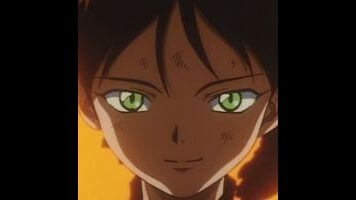Together, the two episodes that comprise “Jupiter Jazz” have never really staid with me in the same way that a superior mythology episode like “Ballad Of Fallen Angels” has. When it comes to characterizations, Cowboy Bebop always employed storytelling shorthand to some extent or another. So I’m not particularly surprised that some of the biggest plot points in “Jupiter Jazz” are contrived as all get out. But some characters’ motives make more sense and are more convincingly expressed than others.
This is bothersome because it speaks to the way that several crucial scenes in this two-parter were just unintentionally poorly developed while others are actually supposed to be open-ended. For instance, you won’t see me complaining about the cryptic content of the talk that Laughing Bull, the Native American shaman we meet in the show’s first episode, has with his son about what makes a “warrior” (“One who has finished his battle somewhere on this planet, a pitiful soul that could not believe in the Great Spirit… ”). But the way that Spike and Jet fall out after Spike hears about Julia is uncomfortably similar to the way they did in “Ballad Of Fallen Angels.”
More than anything else, I think my biggest problem with “Jupiter Jazz” is the way it reaches for a level of significance that it doesn’t know how to achieve. Unlike “Ballad Of Fallen Angels,” “Jupiter Jazz” doesn’t dazzle us with images of the unknowable or directly build on the established relationships of our show’s four main characters (more on this shortly). Then again, perhaps “Jupiter Jazz” is not as accomplished as “Ballad Of Fallen Angels” simply because its goals are more complicated than that earlier episode. This is fundamentally frustrating, even if it’s understandable given the difference between the two episodes’ respective stories. The former narrative was much more about Spike’s antagonistic relationship with Vicious while “Jupiter Jazz” tries to further complicate that relationship by focusing on Julia, the character that directly links Spike to Vicious.
By the end of “Jupiter Jazz,” Spike feels a little more comfortable knowing that Julia is somewhere in space without him. He moves on and that’s a complex sentiment. But that kind of tangled relationship is mostly indirectly developed through Faye’s relationship with mysterious bounty/saxophonist Gren, Gren’s relationship with Vicious, and then Vicious’ relationship to Lin, an ultra-loyal lackey sent by the Van, Vicious’ bosses at the Red Dragon Crime Syndicate. This makes certain details in “Jupiter Jazz” stick out more than others. There are so many different balls being thrown into the air at the same time, many of which, if not all, will eventually lead Spike to feel more comfortable with his lack of a relationship with Julia.
This makes “Jupiter Jazz” more lopsided than actively bad. For example, Lin’s relationship with Vicious is barely touched upon and yet it’s the cornerstone of at least two key scenes. Think of it: Vicious doesn’t shoot Spike, Lin does. Lin’s insistence on coming between Vicious and Spike shows what following “the rules,” the ones that Vicious alludes to and the ones that Gren expected Vicious to follow as a former “comrade,” entails. [Spoiler] But when he jumps in front of Vicious to literally take a bullet for him, that power dynamic between Lin and Vicious goes beyond an appreciable tribute to a romantic, John Woo-style sense of honor and instead just looks flat-out contrived and unimaginative. I can appreciate that this scene is set up in “Jupiter Jazz (Part 1)” when Vicious warns Lin, “Remember this. If you want to survive, you must betray me at times.” But since I don’t know who exactly Lin is nor why he’s so attached to Vicious, I don’t feel the impact of his death like I do when I’m watching Gren gasp for breath after being shot.
Which brings me to what “Jupiter Jazz” gets right: Gren is one of the better one-off supporting characters in the show. Thanks to the photo collage of Gren from his time as a soldier on Titan and composer Yoko Kanno’s soulful saxophone theme for Julia, I really felt like I got to know Gren enough to care about him. Kanno’s theme for Julia in particular deserves recognition, if only for the way that it gives the conversation between Gren and Faye a mood and a pace by which Gren’s expositing is made to look dynamic. The scene’s stakes come from this sad song, a melody that perfectly enunciates the apologetic look on Gren’s face when he tells Faye that he wants to find out if Vicious really did rat him out all those years ago.
And on top of all that, we still get a lot of great gags and telling little ancillary details throughout both episodes of “Jupiter Jazz,” like when Jet sourly offers to let Spike back on board the Bebop. This is when Jet initially tells Spike that if he bags Gren, he’ll consider letting him back on board. There’s a pensive silence on Spike’s end of the conversation and that’s the end of the scene. Furthermore, when Spike does return to the ship, no words need to be exchanged between the two for them to reunite, just: “What’ve you got?” “Nothing.” Then, “Hurry up, we’re taking off.” That’s just the kind of sharp characterizations I expect from Cowboy Bebop. I’m glad that, even if “Jupiter Jazz” isn’t always that good, it does feature such sparks of brilliance.
We’re taking a break from Bebop coverage for a bit. I’m told that we might be back as early as November. See you, Space Cowboys…

 Keep scrolling for more great stories.
Keep scrolling for more great stories.
